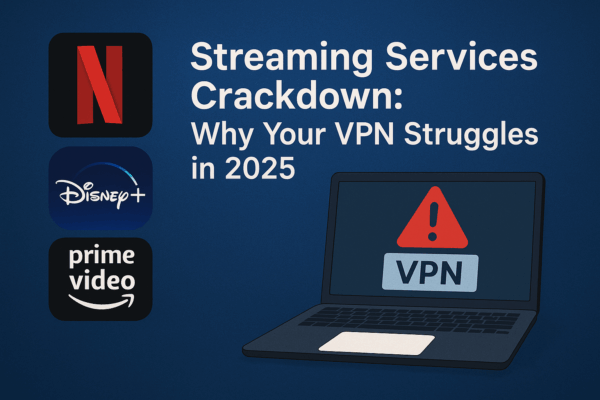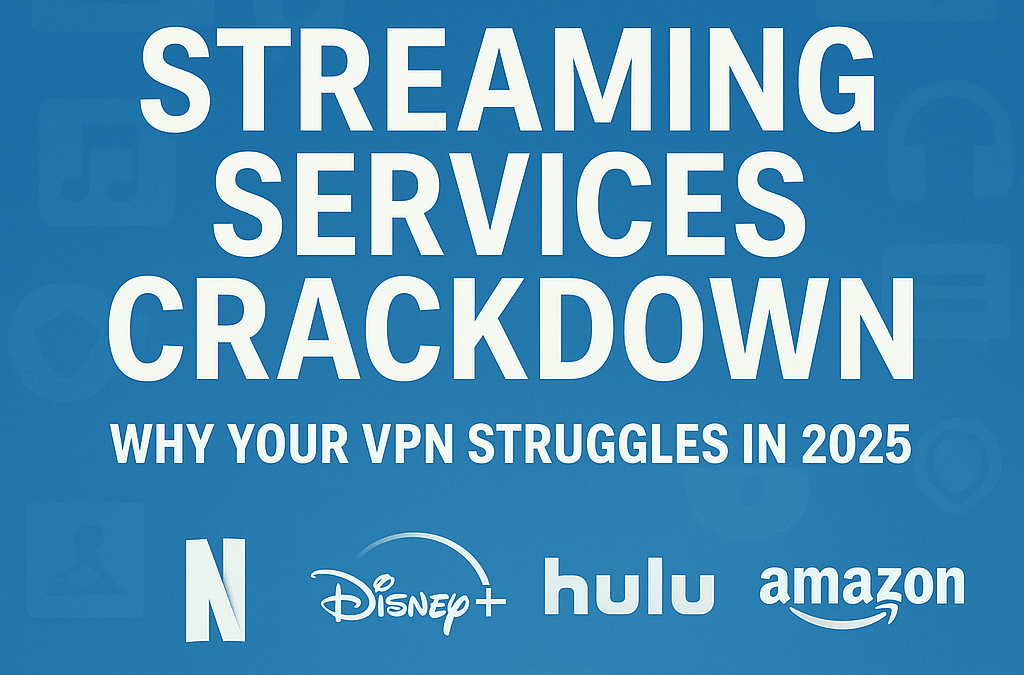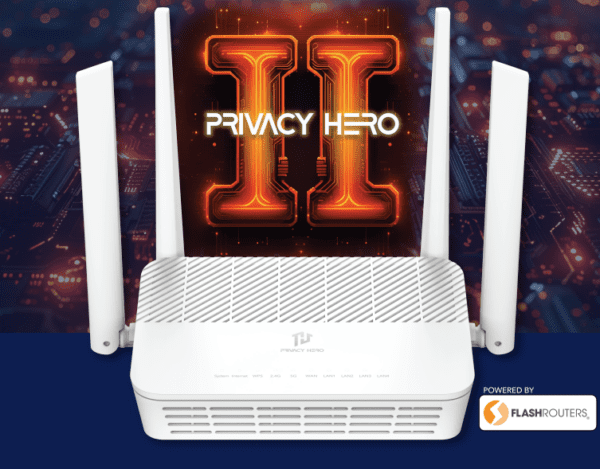Streaming Freedom Series
This is Part 2 – Services Crackdown in our Streaming Freedom series on how devices, apps, and VPNs interact in 2025.
Read Part 1 here: Streaming Device Crackdown 2025.
TL;DR: Streaming Services Crackdown in 2025
- Streaming apps are getting stricter about VPNs, password sharing and location checks – especially for sports.
- Netflix, Disney+/Hulu/ESPN+ and Amazon are using IP reputation, behavior and device data to flag suspicious connections.
- League apps like MLB.TV, NBA League Pass and NFL packages enforce blackout rules and increasingly detect VPN traffic.
- Legitimate VPN users (travelers, expats, privacy-conscious households) are getting caught in the crossfire.
- VPN routers don’t break blackout rules, but they do provide a more stable, privacy-first way to run your VPN for every device at home.

Streaming Services Crackdown: Why Your VPN Struggles in 2025 (Part 2)
If 2024 was the year streaming got more expensive, 2025 is shaping up to be the year streaming services got more aggressive.
Major platforms – from Netflix and Amazon to Disney, Hulu, ESPN+ and the big sports apps – are tightening their grip on account sharing, VPN usage, and anything that looks like unauthorized access. That includes people using VPNs while traveling, fans trying to watch local sports without cable, and anyone relying on older Fire Stick or Smart TV tricks that used to just work.
This post is Part 2 of our Streaming Freedom series:
- Part 1: Streaming Device Crackdown 2025
– how hardware like Fire TV, Smart TVs, and streaming boxes are changing. - Part 2 (this post): Streaming Services Crackdown – how the apps and platforms themselves are tightening access.
Our goal is not to help anyone pirate content. This is a plain-English guide to:
- Why streaming services are cracking down on VPNs and password sharing
- How sports blackouts for MLB, NBA and NFL are enforced at the app level
- Where VPNs still help – and why a router-based setup is often the most stable option
Why Streaming Services Are Cracking Down on VPNs in 2025
For years, many streaming platforms quietly tolerated a reality: people used VPNs to protect their privacy, stream while traveling, or occasionally watch out-of-market content. It was not exactly approved, but it was not aggressively enforced.
In 2025, that is different. You are more likely to see messages like the classic Netflix “You seem to be using a VPN or proxy” error when their systems detect VPN or proxy traffic. Other services do not always show an error; they simply:
- Refuse to play live sports or local games
- Hide certain regional catalogs
- Block logins or require extra verification when locations do not make sense
Rights holders and leagues are also pushing streamers to close loopholes. Sports services know that out-of-market viewing and blackout evasion often rely on VPNs and proxy tools, so they are investing heavily in better detection and enforcement.
How Netflix, Disney+, Hulu and ESPN+ Handle VPNs and Password Sharing
Netflix: Household Rules and VPN Blocklists
- Netflix uses large IP and VPN blocklists, which is why a server that works today may fail tomorrow. Its own help center explains errors like M7111-5059 when VPN or proxy traffic is detected.
- Accounts are tied closely to your “household” and typical location.
- If Netflix decides your connection looks like VPN or proxy usage, it can simply refuse to stream until you disconnect.
Disney+, Hulu and ESPN+: Sharing Limits and Location Checks
- Disney has publicly confirmed a password-sharing crackdown across Disney+, Hulu and ESPN+. Coverage in Variety and other outlets outlines timelines and extra-member fees.
- Shared accounts across multiple households are more likely to be flagged or restricted.
- VPN usage that makes you appear outside your home region can add another layer of friction.
- ESPN+ ties into complex regional sports rights, so blackouts can still apply even if you pay for the service.
Amazon Prime Video, Fire TV and Piracy App Crackdowns
Amazon sits at the intersection of streaming service and device platform. On the services side, Amazon is under pressure from rights holders and leagues to clamp down on illegal sports streams and “fully loaded” setups.
- Reporting from The Verge and other outlets confirms that Fire TV is now actively blocking apps identified as piracy tools, even when they were sideloaded.
- A more locked-down Fire TV OS limits installs to approved apps and makes sideloading less useful for questionable services.
- The crackdown is framed as both anti-piracy and cybersecurity, with warnings about malware and fraud risks in “dodgy” Fire Stick setups.
For legitimate users, that means certain gray-area apps that worked for years may suddenly vanish or stop working, and VPN alone will not override device-level decisions.
Sports Streaming, Blackouts and VPN Restrictions (MLB, NBA, NFL)
Sports is where the Services Crackdown feels most aggressive. League apps and packages such as MLB.TV, NBA League Pass and NFL Sunday Ticket have:
- Strict regional blackout rules based on where you are physically located.
- Clear language stating that blackouts apply even if you pay for a subscription.
- Increased scrutiny on VPN and proxy usage when a connection appears out of market.
MLB, for example, documents how regional restrictions work in its published MLB.TV blackout policy.
The pattern is similar across pro sports: rights are sold by region, and apps are expected to enforce those limits. VPN users – even those who are traveling or trying to reach a home team – often end up as collateral damage.
Who Actually Owns Your Streaming Rights?
Ownership and rights are fragmented, which makes the Services Crackdown feel chaotic. A simplified snapshot for North America:
- Disney – Disney+, majority of Hulu, ESPN and ESPN+.
- Warner Bros. Discovery – Max and a share of various sports rights.
- Comcast / NBCUniversal – Peacock and NBC Sports, plus Premier League and Olympic coverage.
- Amazon – Prime Video plus selective rights like NFL Thursday Night Football.
- Paramount / CBS – Paramount+ and CBS Sports.
- Leagues and regional partners – Separate streaming and RSN deals for MLB, NBA, NFL and more.
When you mix fragmented rights, regional blackouts, device-level controls and service-level VPN detection, you end up with customers who feel like they are doing everything right but still hit walls.
How Streaming Services Detect VPN Traffic
Most platforms do not need to know which VPN you use. They only need to decide whether your connection looks like a normal residential subscriber.
- IP reputation: Many VPN IP ranges are known data-center or proxy addresses.
- Connection patterns: Lots of accounts using the same IP, or accounts jumping between countries.
- Geo and DNS checks: Comparing your IP, DNS and device hints to see if they align.
- Account behavior: Multi-household usage, unusual travel patterns or incompatible regions.
This is why switching to random free VPNs usually makes things worse. You are just joining heavily flagged IP pools that platforms already distrust.
Legitimate VPN Use Cases That Get Caught in the Crackdown
Not everyone using a VPN with streaming is trying to cheat the system. Common legitimate use cases include:
- Traveling professionals who want access to the same services they pay for at home.
- Privacy-conscious users who prefer not to expose all viewing habits to their ISP.
- Expats who still maintain a home in their country and pay for local streaming accounts.
- Shared housing, roommates and multi-generational households that do not match strict “single household” definitions.
Streaming services do not always differentiate. If traffic looks like VPN or proxy use, it is often treated as high risk and either blocked or throttled.
Why a VPN Router Still Helps for Streaming
A VPN router is not a magic key that makes every geo-block or blackout disappear. What it does provide is a more stable, consistent environment for legitimate VPN use with streaming.
- One secure tunnel for the whole home. You centralize VPN protection instead of juggling apps on every device.
- More predictable behavior. Router-based VPN setups usually use stable endpoints instead of constant server hopping.
- Always-on coverage. Smart TVs, consoles and streaming sticks are protected without extra configuration.
Paired with a reputable VPN that invests in streaming support, a VPN router can:
- Reduce random disconnects and app conflicts.
- Make it easier to share a consistent location across multiple devices.
- Help travelers and remote workers keep a secure link back to home base.
A VPN router does not change the terms of service of any streaming provider. You should always use VPNs in line with local law and each service’s agreements.
Streaming Services Crackdown Snapshot
Here is a quick snapshot of how major services approach VPNs and sharing in 2025:
- Netflix: High VPN detection, household-based sharing and frequent proxy errors.
- Disney+ / Hulu / ESPN+: Password-sharing crackdown, account verification and complex sports rights.
- Amazon Prime Video: Piracy app bans and Fire TV OS changes that affect sideloaded apps.
- League apps: MLB.TV, NBA League Pass and NFL packages rely on strict blackout rules and VPN scrutiny.
Pair this with the comparison table in Part 1 – Streaming Device Crackdown 2025 for the full picture.
Practical Tips to Survive the Streaming Services Crackdown
- Audit what you actually watch. Rotate one or two services per month instead of paying for everything at once.
- Use strong, unique passwords and two-factor authentication. More devices and apps means more opportunities for account compromise.
- Be upfront with your household. Understand how password-sharing rules are changing and decide who truly needs access.
- Use a reputable VPN, ideally via a router setup.
A VPN router centralizes protection for your whole home instead of managing a dozen different apps. - Avoid sketchy streaming apps and fully loaded devices. Legal, cybersecurity and privacy risks are rising as platforms and law enforcement focus more on piracy.
How This Streaming Services Guide Connects to Our Device Crackdown (Part 1)
Together, the two posts offer a complete picture:
- Part 1 – Streaming Device Crackdown 2025: Fire TV, Smart TVs, Roku, Android TV, locked-down app stores and why some boxes are becoming less flexible.
- Part 2 – Streaming Services Crackdown 2025 (this post): Netflix, Disney/Hulu/ESPN+, Amazon and league apps tightening rules around VPNs, password sharing and blackout enforcement.
Hardware is getting more locked down. Services are getting more aggressive. Customers feel both at once.
Keep Exploring Streaming, VPNs and Router Guides
- Part 1 – Streaming Device Crackdown 2025:
How Fire TV, Smart TVs, Roku and other hardware are changing. - VPN Router Basics:
Not sure where to start with router-based VPN setups?
Visit our VPN Types & VPN Router Overview to compare options. - Looking for our latest top picks?
Check out our up-to-date buyer’s guide to the best VPN-ready routers for streaming, privacy and remote work.
See the Best VPN Routers guide
- Want a NordVPN-first setup?
Learn more about the Privacy Hero 2 NordVPN Router, built for whole-home NordVPN coverage.
How FlashRouters Helps With VPN Routers for Streaming
FlashRouters cannot change the rules that Netflix, Disney, Amazon or MLB.TV set – and we will not tell you to break service terms.
What we can do is give you a more secure, stable foundation for your home network:
- Pre-configured routers for leading VPN services, including NordVPN, ExpressVPN, Surfshark and more.
- Centralized VPN protection for every device on your network – from Smart TVs to consoles to streaming sticks.
- Expert support for streaming and privacy questions, so you are not troubleshooting alone.
If you want a NordVPN-optimized experience, explore the Privacy Hero 2 NordVPN Router,
designed specifically for NordVPN users who want whole-home protection without installing apps on every device.
Even as big streaming platforms change the rules, you can choose not to fly blind. A VPN router-based setup helps protect your privacy, simplify your network and stay ready for whatever comes next.






